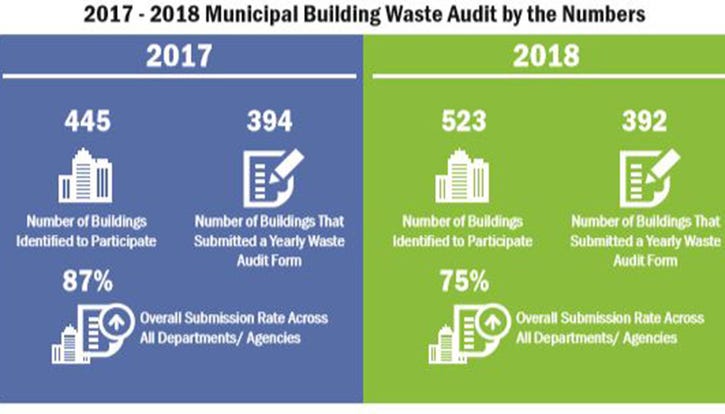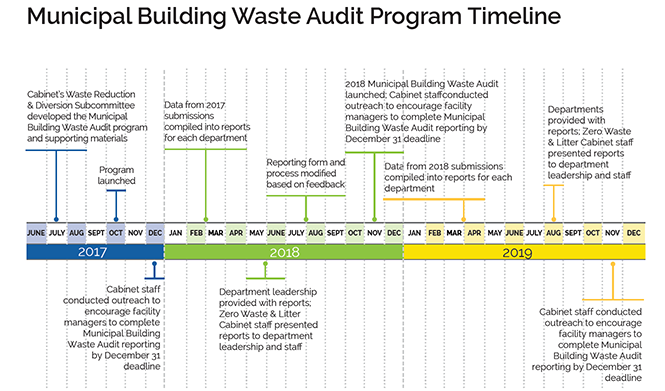Takeaways from Philly’s Municipal Building Waste Audit Program
Results from the first two years of the city’s audit program report outline waste challenges, takeaways and opportunities for improvement.

The city of Philadelphia’s Zero Waste and Litter Cabinet just released its first “Municipal Building Waste Audit Report,” which provides insights and data analysis from the first two years of the program’s implementation.
The report also provides recommendations for how the cabinet can continue to promote sustainable waste management practices in Philadelphia’s city-owned and operated facilities.
“When it comes to recycling and other practices that divert waste away from the trash, municipal agencies should not only comply but should lead by example,” said Nic Esposito, director of the Zero Waste and Litter Cabinet, in a statement. “The Municipal Building Waste Audit is one more way we are moving Philadelphia toward our ambitious goal of becoming zero waste and litter free by 2035.”
The Municipal Building Waste Audit Program requires all city-owned facilities to submit a waste audit form annually to report on which materials the facility generates, the waste haulers servicing the facility and any waste-related challenges. The program aims to get building operators and staff to think more about the waste they generate while engaging city employees in Philadelphia’s zero waste movement.
The following city departments/agencies participate in the waste audit program:
Fire Department
Health Department
Police Department
Department of Licenses & Inspections
Department of Prisons
Department of Public Property
Division of Aviation, Commerce Department
Free Library
Judicial Courts
Office of Fleet Management
Philadelphia Parks & Recreation
Southeastern Pennsylvania Transportation Authority
Streets Department
Water Department
In 2018, 392 city-owned and operated buildings—representing a 75 percent submission rate—completed waste audits as part of the program. A selection of outcomes from the report include:
New contracts established for recycling construction and demolition debris and waste cooking oil.
Combining the city’s electronic waste and universal waste contracts to streamline the recycling process for these materials.
Establishing composting systems and other waste reduction and diversion programs onsite at city facilities.
Increasing outreach to city departments with information about recycling requirements and best practices, proper disposal and recycling contracts and procedures and how to divert new materials from the trash. This information was also made easily accessible on CleanPHL.org.
Installation of new waste corrals to cut down on illegal dumping at Philadelphia Parks & Recreation sites.

The report also includes insights from each city department participating in the program, outlining their unique waste challenges, takeaways and opportunities for improvement, as well as highlights from sites that have implemented unique waste management solutions, such as composting systems and hydration stations to reduce the need for single-use plastic bottles. The most common challenge at municipal buildings in the 2018 Waste Audit was staff and community education and/or a lack of recycling signage, leading to issues with properly separating materials and recycling stream contamination.
Building managers who go above and beyond to pursue zero waste in their buildings and complete monthly reporting can achieve recognition through the cabinet’s Zero Waste Partnership Program. So far, 50 municipal buildings consistently report on their monthly waste generation, and the average reported monthly waste diversion rate over the course of the program across all participating sites has been 21 percent.
“We’re glad to lead by example in this effort and assess our waste management practices on an ongoing basis,” said Steve Hartner, deputy commissioner of facilities for the city’s Department of Public Property, in a statement. “Working with our operations and custodial staff to track waste, making sure they have what they need and that they are reporting any waste and recycling issues in our buildings goes a long way toward helping us better understand and reduce our waste.”
The program, which was modeled after Philadelphia’s commercial waste reporting requirements, is unique to Philadelphia. Asking city departments and agencies to take a yearly assessment of their waste management practices and identify potential areas for improvement allows the city to continually improve its practices and lead by example in its efforts to advance toward its zero waste goals, the city reports.

What’s Next?
The Zero Waste and Litter Cabinet concluded by stating that it is looking forward to continuing the yearly Municipal Building Waste Audit and using the data collected through this program to troubleshoot issues and connect city department staff with tools to help them minimize waste at their facilities. Conducting this annual assessment of waste management practices at city properties, engaging with staff to ensure they understand waste and recycling best practices, working continuously to make improvements and implementing new waste reduction and diversion initiatives will allow for better understanding and management of waste in Philadelphia’s municipal sector, the city maintains.
The program exists alongside efforts to benchmark commercial waste management practices through the city’s Commercial Waste Report requirements and to incentivize and reward commercial properties for implementing sustainable waste management practices through the Zero Waste Partnership Program.
About the Author
You May Also Like


.png?width=300&auto=webp&quality=80&disable=upscale)